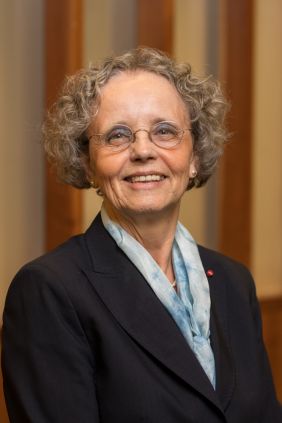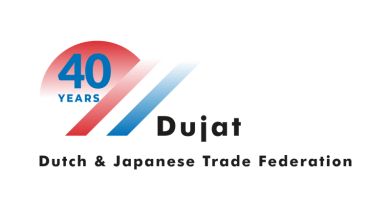
EU-Japan cooperation takes many forms. Time and time again, we read news reports about agreements signed between the EU, or its Member States, and Japan, about trade missions and cultural events, about joint innovation and dialogue. But the question remains: Who are the people behind these efforts? What is their story and how did they become involved in developing international cooperation?
The EU-Japan Centre for Industrial Cooperation is happy to introduce the fourth installment in a series of articles introducing the individuals and organisations making EU-Japan collaboration a reality.
 |
Christa De Kemp, the Managing Director of the Dutch and Japanese Trade Federation (DUJAT). |  |
Q: What is your professional background?
Christa: I studied Law and graduated from the University of Amsterdam. I started my career as a young lawyer at the City of Amstelveen.
Q: You have a long experience working with public organizations, especially municipal authorities – how has it shaped your approach to EU-Japan and Japan-Netherlands relations?
Christa: One of the first responsibilities I encountered while working for the City of Amstelveen was making a contract for the site Canon Europe bought in order to build their new European HQ. It was the first time I met with Japanese businessmen and their way of communicating. I was very impressed, especially seeing how loyal and trustful they were. I also felt very much appreciated for my efforts and involvement. EU-Japan relations became more and more important in my career in the upcoming years. For example, organizing seminars always involves EU-Japan related matters.
Q: It seems significant that amsterdam inbusiness (the official foreign investment agency of the Amsterdam Metropolitan Area), where you had worked for 9 years, has a desk dedicated to Japan among other regional desks. What do you think enabled such a big Japanese community to develop in the area and what was the role of the Japan desk at the agency?
Christa: It was always my goal to build up strong relations with Japanese companies and their expats in our region. For that purpose, I visited them many times and asked what they needed to feel really at home and appreciated in our region. Besides various questions regarding their business, it was clear to me that they would like to have medical institutes dedicated to the Japanese community. Based on this, I managed to open a Japan Desk in the Amstelveen hospital and I made sure there were Japanese dentists available. Besides the medical issues, I made sure the Japanese kindergarten moved to a convenient area where many Japanese families live in Amstelveen.
In addition to all this, I organized big cultural events for the Japanese community with other partnering organizations, like the Japan Festival and the Sakura Festival. I believe all these helped to grow the Japanese community in the Amsterdam area. Another important point was the strong relationship with the Japanese Embassy in the Netherlands and the Japanese Chamber of Commerce in the Netherlands. I cherished the relationship with them from the very beginning.
Q: During your time at the Amsterdam and Amstelveen offices, especially the Japan Desk of amsterdam inbusiness, is there a significant success or challenge that you would like to share?
Christa: The challenge was always the visa procedure for the newcomers. For me, it was important to maintain good contact with the expat center. Every time we managed to solve a visa issue, it felt like an achievement.
On the side of successes, during my time working for amsterdam inbusiness, I started organizing seminars together with NFIA Japan in Osaka and Tokyo for prospects. These seminars were quite successful and brought many new investments to the Amsterdam Area. At the end of my career working for amsterdam business, I was even honored by the Japanese government with a decoration in the order of the Rising Sun.
Q: For the last 7 years, you have been working as Director of DUJAT, the Dutch & Japanese Trade Federation. Can you tell us about your mission as an organization, and what have been your main activities in order to consolidate the relations with Japan and its market?
Christa: When I started this job, I found out Dujat was only focusing on the Amsterdam area. But Japanese companies are spread out all over this country, so I started to cooperate with the regional development agencies. Now nearly all regional development agencies are a members of Dujat and we manage to organize great projects together. A second topic I was working on was strengthening the networking moments for the members. We found out that networking opportunities are one of the most important reasons to become a member of Dujat. The result is that the number of members of Dujat doubled in the last 7 years.
Q: What projects does DUJAT plan for the future? Anything special you would like to mention and promote?
Christa: The Board of Dujat emphasized the importance of getting the younger generation more involved within the Dutch Japanese business community. We started an essay contest among students of Dutch universities in close cooperation with the Vrije Universiteit Amsterdam. Our first attempt was a success. At this moment, we are working on a second edition, which will launch in March this year.
Q: In your experience, what are some good practices that Dutch companies employ when they try to reach Japan, or vice-versa, when Japanese companies attempt to cross over to the Netherlands?
Christa: In my experience, the most important advice for Dutch companies is not to expect immediate results. It takes time to build a strong and trustful relationship with Japanese companies. It is also important to maintain the relationship by keeping in contact. For Japanese companies, I would say the Netherlands is a good country to invest and Dutch people are very welcoming and ready to help. If you need assistance or advice, feel free to ask NFIA Japan or contact Dujat in the Netherlands.
Q: You seem to have been part of a few foundations, for example, you were on the Board for the Foundation Japan Festival and the Foundation Japan desk Amstelland Hospital. What has motivated you to be a part of these diverse foundations?
Christa: As a matter of fact, I was the founder of these Foundations, so I stayed on the Board. At the same time, I also founded the IBFA (International Business Foundation Amsterdam) to help foreign companies in the Amsterdam area to network with each other. I resigned from all of these Boards because there are other capable people out there to take over my role. For now, I am focusing on strengthening Dujat further.
Q: How do you see the current relations between the Netherlands and Japan in the forthcoming years?
Christa: The relations between the 2 countries have already existed for more than 400 years. They are strong and many people are working constantly in the Netherlands as well as Japan to make these relations even stronger. They will continue to grow, and I do hope that I can be part of it in the coming years.
Thank you very much, Christa, for your availability and insights given in this interview, it has been a pleasure. (Interview held in February 2024)
For the next interview with our Vulcanus mentors Dr. Hannes Voraberger and Mr. Massimo Esposito, to hear about their Vulcanus experiences, you can click here.
Curious about the previous interview with Anna-Maria Wiljanen, the Director of the Finnish Institute in Japan and one of the vice presidents of the Board of Directors of the Finnish Chamber of Commerce and Industry in Japan? Click here!
The EU-Japan Centre currently produces 5 newsletters :










Joint venture established in 1987 by the European Commission (DG GROW) and the Japanese Government (METI) for promoting all forms of industrial, trade and investment cooperation between the EU and Japan.
The EU-Japan Centre’s activities are subject to the allocation of a Grant Agreement by the European Commission for 2024-2026

